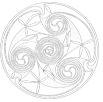Interrupting Heroic Patterns
By Paul Dunion | July 7, 2021

There are several roles that children can take on in a family. The more stress in a family the more rigidly children cling to one particular role, which leaves the advantages of the other roles unavailable to them. The most popular role is identified as the Hero. Inevitably, this child will receive the most positive attention, encouragement, and praise. It is a coveted family role, often reserved for the oldest or an only child.
There are a number of favorable qualities associated with the hero role. Heroes know how to read and respond to the expectations of those holding authority. They tend to be very willing to take on responsibility for a task. Heroes are typically steadfast and reliable regarding their work ethic. They are regularly willing to take on a measured risk. They are often quite clear about their values and what it means to live in integrity.
However, when the role is taken on inflexibly, not refined by the features of other roles, beneficial characteristics, as well as more harmful heroic tendencies, can easily be carried into adulthood. These children easily become leaders and helpers, such as doctors, nurses, psychologists, social workers, clergy, teachers, consultants, and executive coaches. Let’s look at the characteristics of this role that need repair.
Prominent Characteristics
*Loving and being lovable are organized and defined as achieving. The dilemma is that the Hero will feel condemned to endless manifestations of success as demonstrations of self-worth.
*Excessive striving. Heroes are constantly striving to get life right. This strenuous effort places a serious prohibition upon living with peace and joy.
*Have trouble feeling satisfaction with their achievements. The demand for perfection won’t allow for feelings of gratification and fulfillment.
*Weaknesses are easily denied. Heroes can be highly attached to what I call a shiny persona, an investment in looking good. They turn to their strengths again and again. A typical strength for a hero is intellectual acuity, which leaves their emotional intelligence ignored and underdeveloped.
*Compulsive self-reliance. As the need to see themselves as accomplished expands, so does the need to see receiving assistance and support from others as unnecessary. This exaggerated independence can greatly hamper a capacity for collaboration and collective problem-solving. It also disables an abiding ability to be relational.
*Emotional isolation. One consequence of the heroic self-reliance is the absence of genuine rapport, where they would feel known, understood, and loved.
*Identity can be trapped in a high-achieving role. Heroes often do not know who they are beyond the scope of their professional roles.
*Easily generate the illusion that they can save others. To bolster their much-treasured self-concept as highly capable, Heroes easily come to believe they can actually save others. This illusion easily shifts into resentment as others appear not to respond favorably to heroic gestures of attempting to save. Heroes can easily remain distracted by their saving efforts, thereby neglecting the only person they can save, themselves.
Healing for Heroes
More than any other family role, Heroes deny that they need help. Consequently, it can be very challenging for them to get the support that they need in order to outgrow the debilitating aspects of the role. However, if they can find enough humility and courage as well as a resource that is not seduced by their level of success, then the following interventions can go a long way to restore Heroes to the fullness of their humanity.
*Letting go of achieving as a measure of love. Achieving condemns Heroes to conditional self-love, leaving them condemned to proving that they are okay over and over again. They can at least approach living with unconditional self-love by committing to living with more humility. If we understand humility as the gracious acceptance of personal limits, then Heroes can gradually shed the need to demonstrate their worth. They can live with the compassion and acceptance for all of themselves, and not just those who succeed. As a result, what makes them lovable to others is their authenticity, a capacity for compassion, generosity, and gratitude. Heroes tend to give others the power to confirm their personal value by being excessively attached to being impressive. Watching such an attachment and interrupting it is a wonderful way for Heroes to reclaim the power to confirm their own worth. A recent conversation with a recovering Hero demonstrated the spiritual practice of tracking and interrupting an attachment to being impressive. “I’ve been tracking my need to impress for some time. Recently, I noticed that not only do I want the listener to be impressed with my varied performances, but I also want whoever is listening to be impressed with the subtly with which I deliver my declarations.”
*Interrupting excessive striving. As Heroes begin to accept who they are now, the need proves their worth is mitigated, allowing for unnecessary endeavoring to subside. It becomes especially important for Heroes to learn how to reclaim a lightness of heart. Learning how to play non-competitively, taking walks with family and friends, finding permission to sing and dance, finding a way to express themselves creatively and beginning to notice and feel what touches and moves them emotionally.
*Feeling deep satisfaction for a job well done. When heroes begin to mitigate the quality of job performance as a measure of their personal worth, they can begin to simply feel the reward of having optimized their efforts with desired results.
*Carrying an internal bow. Carrying the metaphor of an internal bow allows heroes to embrace a realistic view of their humanity. The metaphor points toward what is larger than the individual Hero. It may be a support group, a team, Nature, a family, or a deity. The key is to remain in relationship with something larger than one’s ego, holding the faith that whatever is larger can provide more than an individual effort. Coming back to holding gratitude over and over again can greatly support the connection to something larger.
*Inventorying & accepting strengths and areas of development. Heroes often know their strengths and tend either to be unconscious of or in denial about areas needing development. Shortcomings simply don’t go with the role, which leaves heroes with a skewed self-concept. At its worse, heroes will feel shame about their limitations. It can be helpful to work closely with practitioners, coaches, and developmental assistants to canvas areas of development over and over again as simply ways of growing and not a self-indictment. As mentioned earlier, Heroes typically have well-developed intellects and are in need of paying attention to their emotional intelligence. This becomes particularly important as neuroscientists remind us that emotions have a large impact upon the formation of beliefs and ensuing actions.
*Learn to empower others rather than attempting to save. Even when saving looks like it might be working, it enables the disempowerment of the person allegedly being saved. Efforts directed at saving do not affirm the competency, intelligence, and capability of people. Gestures of saving are simply displaying of the savior’s prowess. There’s always room for Heroes to become better listeners while helping others to identify both internal and external resources. In doing so, Heroes empower others, supporting the agency of those around them.
Hero children loved their parents by performing academically and/or athletically. They offered their caregivers a pleasant distraction from the challenges they faced. Ultimately, these children become adults who need to reorganize and refine how they will love themselves and others. Their personal and professional empowerment greatly depends upon bringing qualities of forgiveness, compassion, humility, generosity and gratitude to their evolving definition of love. This new vision can only manifest by a fervent commitment to live a self-examined life.
There are a variety of ways the personality of recovering Heroes might show up differently. We can see the notion of living more consciously manifesting cognitively, emotionally, and behaviorally. The expression of ideas happens with less urgency, replaced by a faith that more will be revealed. There is less of a tendency to lean toward some contrived certainty, with a greater capacity to hold ambiguity. There is also a greater ability to welcome diverse perspectives.
On an emotional level, recovering Heroes can have a felt sense of emotional energy in their bodies. They can also name and verbally express emotions. This opens the Hero to welcoming the emotions of others, with empathy rather than offering a solution or some form of guidance. As emotional intelligence increases, Heroes begin to suspend the dynamics of ‘win-lose’ and ‘right-wrong’ in their conversations. People begin to see the recovering Hero as someone with whom they can expect to be heard and understood. The Hero is likely to be perceived as a muse for deeper collaborations and co-creation.
There are several behavioral benefits characteristic of the recovering Hero. The first is a diminished use of primitive psychological defenses such as domination, excessive adaption, and distancing physically and/or emotionally. These defenses are replaced by the employment of effective boundaries. (See my book, Dare to Grow-Up for a detailed account of effective boundaries.) Secondly, there is a diminished likelihood that authority is either abdicated or abused. Authority is held by an increased sensibility regarding whether a culture needs more encouragement and/or direction infused into it. Lastly, the recovering Hero takes joy in expressing appreciation for the commitment, efforts, and accomplishments of others.
